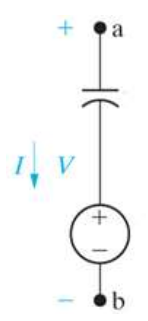I may be asking something trivial, but unfortunately, I could not find an answer so far.
Suppose an AC circuit. The voltage of the capacitor is given by
$$v_C(t)=Q(t)/C = 1/C [ \int_0^t i_C(τ)dτ + v_C(0)]$$
and the current is
$$i_C(t) = C \frac{dV_C(t)}{dt}$$
Their Laplace transforms are: $$V_C(s) = \frac{I_C(s)}{Cs}+\frac{V_C(0)}{s}$$ and $$I_C(s)=sCV_C(s)-CV_C(0)$$ According to Ohm's Law: $$Z_C(s) = V_C(s)/I_C(s)$$ By substituting, $$Z_C(s)=\frac{1}{Cs-\frac{V_C(0)}{V_C(s)}}$$
It is known that $$Z_C(s)=\frac{1}{Cs}$$ which obviously occurs from the above equation if \$\small V_C(0)=0\$, but that is not always the case. Could someone explain this issue? What happens if my capacitor's initial condition is not zero?

